Russian Liberals Offer Own Constitution Plan : Government: The draft goes further than version already in circulation, allowing ethnic groups to negotiate special status.
- Share via
MOSCOW — Fearing that a constitution proposed for Russia might revive a “totalitarian society,” prominent liberals on Friday presented a draft constitution of their own, inspired by the democratic vision of the late dissident Soviet physicist Andrei D. Sakharov.
The document, spearheaded by St. Petersburg Mayor Anatoly A. Sobchak, a former professor of constitutional law, draws on both Russian traditions and foreign constitutions, including that of the United States.
In the near term, it sets the stage for a battle at the Russian Congress of People’s Deputies, which opens April 6, over what kind of fundamental law to give post-Soviet Russia.
Under one of its most important features, the liberals’ 76-article draft would allow each of the country’s ethnic groups to negotiate its own status inside Russia, as the Finns, Poles and others did under the czars.
Another draft constitution written by a committee headed by Oleg G. Rumyantsev has already been approved in part by the Supreme Soviet, Russia’s smaller working legislature.
Rumyantsev said Friday that his committee’s draft would create a “semi-presidential system”--in other words, President Boris N. Yeltsin could appoint government ministers but they could be fired by the legislature, giving lawmakers an important check on the executive.
The spirit and letter of Rumyantsev’s draft represent a huge departure from the sham constitutions of the Soviet era.
But Sobchak and former Soviet Constitutional Compliance Commission Chairman Sergei S. Alexeyev, authors of the liberals’ draft, complained Friday that Rumyantsev’s proposal dangerously does not break cleanly enough with the Communist mind-set.
The draft now making its way through the Supreme Soviet is loaded with “theoretical declarations” and prescriptions for civil society that are “a heritage of Stalinist times,” Sobchak told a news conference.
“We are not in the ranks of the Lord God; society has lived, lives and will live by its own laws,” Sobchak said.
Harking back to the practice of the Russian Empire, the document drawn up on behalf of the Russian Democratic Reform Movement extends to minority homelands the right they once possessed to negotiate special powers and privileges with the central government.
Such tailor-made agreements would be a lot more successful than the single, take-it-or-leave-it federal treaty scheduled to be signed next Tuesday for placating restive minorities such as the Tatars and Chechens and enticing them into the Russian Federation, Sobchak said.
To insist on uniformity, he said, would be disastrous. For it was the Kremlin’s inability to grant varying degrees of autonomy and statehood to minorities that was “the issue on which the U.S.S.R. broke up, and on which--God forbid--Russia may break up as well.”
The liberals’ draft is admittedly inspired by the constitution that Sakharov, a Nobel Peace Prize winner and human rights activist, drew up before his death in 1989 for a federation of “Eurasian states” to succeed the Soviet Union. “When we worked, we asked ourselves: what would Andrei Dmitrievich have said?” Alexeyev said.
The draft, hastily put together during the past month, also embraces ideas from exiled Russian novelist Alexander I. Solzhenitsyn, who seeks the revival of the old Russian territorial assembly and provisions of the U.S. Bill of Rights barring Congress from legislating curbs on fundamental civil rights.
Unlike Rumyantsev’s draft, Sobchak’s document would abolish the death penalty and create a “people’s guardian” to safeguard civil liberties.
Quite intentionally, the document begins with a list of the rights of Russians.
The first person to whom a copy was sent was Yeltsin himself, Sobchak said.
Yeltsin has mostly kept his views on the constitution to himself, and Sobchak said the Russian president had said that he would propose a document at the Congress that he himself endorses.
More to Read
Sign up for Essential California
The most important California stories and recommendations in your inbox every morning.
You may occasionally receive promotional content from the Los Angeles Times.













